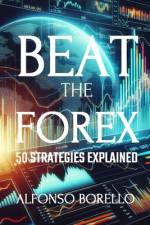- 50 Strategies Explained
av Alfonso Borello
157
Uncover the secrets of successful Forex trading with this comprehensive guide to 50 proven tactics. Whether you're a seasoned trader or just starting out, this in-depth conversation provides a wealth of insights to help you unlock the potential of the Forex market. With expert analysis and practical advice, we delve into each tactic, exploring its pros and cons, appropriate currency pairs, timing considerations, and recommended position sizing, stop loss, and take profit strategies. From trend following to counter-trend trading, day trading to swing trading, and more, we've got you covered. Don't miss this opportunity to learn from the pros and gain a deeper understanding of the strategies that drive successful Forex trading. Join us as we embark on this journey to conquer the Forex market, one tactic at a time. P.S. As of February 2024, AI, or Artificial Intelligence, is erratic and cannot be accepted as reliable. We are not writing dialogue or poems. We are dealing with money, and nothing is more important than screen time. Forex: Risky Rollercoaster or Lucrative Path? Weighing the Skeptics' Arguments Skeptics have several reasons for doubting the ability to make money in the Forex market, and it's important to consider their arguments before diving in. Here are some key points: High Risk: Forex is inherently risky due to volatile exchange rates, leverage, and complex economic factors. Skeptics point out that large losses are more common than consistent profits, especially for inexperienced traders. They emphasize the potential for emotional trading leading to poor decisions and financial ruin. Zero-Sum Game: The Forex market is a zero-sum game, meaning for every winner, there is a loser. This translates to the fact that someone else's gain comes from your loss (excluding transaction costs). Skeptics argue that this inherent competition makes consistent profitability challenging, as you're essentially competing against professionals and institutions with superior resources and information. Market Inefficiency: Some believe the Forex market is efficient, meaning prices already reflect all available information. Skeptics argue that if this is true, it's nearly impossible to consistently outperform the market through analysis or prediction, making profits difficult. Predatory Practices: Unfortunately, the Forex market has its share of scams and misinformation. Skeptics highlight the prevalence of unregulated brokers, unrealistic profit promises, and get-rich-quick schemes, raising concerns about being misled or taken advantage of. Psychological Challenges: Successful trading requires discipline, emotional control, and risk management. Skeptics point out the psychological difficulty of sticking to a strategy under pressure, avoiding impulsive decisions, and managing losses effectively. They argue that many traders lack the necessary mental fortitude for long-term success. Alternatives: Skeptics might suggest alternative investment avenues with potentially lower risk and higher returns, such as diversified long-term investing in established stock markets. They argue that these options offer a better chance of achieving financial goals without the risks inherent in Forex trading. It's important to note that these are just some of the arguments skeptics make, and they are not necessarily definitive. There are successful Forex traders, but it's crucial to understand the risks and challenges involved before entering the market. Here are some additional points to consider: Do your research thoroughly: Educate yourself about Forex trading, learn about different strategies, and understand the risks involved before investing any money.Start small and trade responsibly: Begin with a small amount of capital and avoid using leverage until you have gained experience and confidence.





























